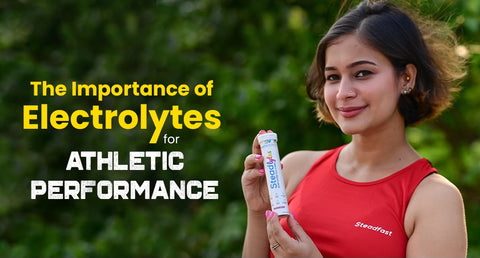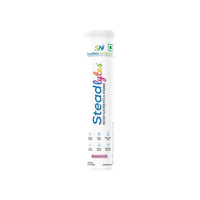An athlete isn’t made in a day - it takes blood and sweat to become one. But do you know this fact about athletes and their athletic performances? On average, individuals engaged in athletic activities tend to exhibit more sweat than those who are not physically trained. When the body begins to overheat, the nervous system triggers the activation of sweat glands, initiating the process of sweating as a means to regulate the body's temperature.
Athletes sweat a lot because they do lot of intense exercises and consequently end up losing important nutrients, electrolytes and minerals. So, athletes need to take the right nutrients and drinks during and after their workouts to recover and stay hydrated. Fluids and electrolytes help maintain total body water. A deficiency of these (hypohydration) will lead to an increase in cardiovascular and thermal strain and negatively impact aerobic performance. Excessive exercise may lead to plasma potassium disorders while long-lasting endurance exercises may lead to hypokalaemia (profuse sweat losses); high-intensity training which an athlete is not used to may cause hyperkalaemia, impacting an athlete’s health and performance and necessitating the use of electrolytic supplements.
During a tough workout, it's normal for athletes to forget to drink enough water, which negatively impacts hydration level. Not drinking enough water can hamper workout and ultimately athletic performance or make you perform worse than what they had set out to do. Even being a little dehydrated, like losing 1-2% of the body weight in sweat, can make you feel like you're working harder and impact what you do and how well you do it. It also slows down recovery after exercising because the body can't deliver nutrients and oxygen to the muscles as effectively and can't get rid of waste from the blood. So, it's important to rehydrate during and after workouts.
Symptoms and Impact of Electrolyte Imbalance on Athletic Performance
Unbalanced electrolytes can have a variety of negative repercussions, including muscle weakness, cramps, abnormal heart beats (from low potassium, sodium, calcium, or magnesium levels), which may cause cardiac problems. Dizziness, disorientation, and fatigue might also happen, impacting athletic performance Constipation, diarrhoea, and other gastrointestinal problems can appear. While calcium imbalances may have an impact on bone health and raise the risk of fractures or osteoporosis, high salt levels have been linked to fluid retention and swelling. Alterations in electrolytes can also play a role in kidney stone development. To prevent these health problems, it's essential to maintain a good balance through food, water, and medical advice as necessary.
Athletes’ performances depends on their electrolytes levels and these levels in the bloodstream can become imbalanced, either too high or too low, due to various factors, including changes in body water levels. Crucial electrolytes like sodium and potassium are lost through sweat during exercise. Swift fluid loss, as seen in diarrhoea or vomiting, can also impact electrolyte concentration. In such cases, it's essential to restore the body's electrolyte balance.
How Much Electrolytes do Athletes Lose with Every Training Session?
As per the information stated in a study published under Sports med. section of the National Library of Medicine, when you work out, your body sweats to cool down. In certain cases, like long or intense workouts in hot weather, athletes can lose a lot of sweat, which can upset the balance of water and electrolytes in the body and hinder athletic performance. So, it's important to drink enough water and replace these electrolytes lost through sweating to stay hydrated and perform well during exercise.
Moreover, sweat tests can be useful for figuring out how much athletes sweat and how much sodium they lose in their sweat. This information can be used to give personalised advice on how to drink and replace electrolytes.
The study by NCBI further explains how sweat test results can vary due to several factors. Short-term changes in sweating can happen because of how hard and long you exercise, the weather, what you wear, how hydrated you are, your hydration level, and your body's internal clock. On the other hand, long-term changes can occur if you get used to the heat, do regular aerobic exercise, or change your salt intake. Your body's characteristics like weight, body fat, gender, menstrual cycle, age, medications, health conditions, and genetics can also affect how you sweat and the amount of sodium in your sweat. So, many things can influence your sweat and sweat test results.
When Should an Athlete Refuel Electrolytes?
Athletes can drink fluids including sodium (salt) in their diet before, during, and after exercise for specific reasons. It helps them maintain their overall body water, which is crucial because not having enough water can strain the heart and make them perform less effectively in aerobic activities or hamper their athletic performance. When athletes exercise intensely in hot weather, they sweat, losing both water and salt. In such cases, they may need to quickly replace the lost water and salt, especially if they want to recover fast or if they've lost a lot of body weight due to sweating.
The Recommended Electrolytes Intake for an Athlete
Athletes should aim to consume sufficient electrolytes, such as sodium, potassium, calcium, and magnesium, to support optimal performance and prevent imbalances caused by sweating during exercise. Recommendations typically include incorporating electrolyte-rich foods and beverages into their diet before, during, and after workouts. While specific requirements vary depending on factors like fitness and activity level and environmental conditions, athletes should strive to meet daily intake guidelines, which typically range from 2,000-3,000 milligrams of sodium, 3016 milligrams of potassium for men and 2320 milligrams for women, and appropriate amounts of other electrolytes based on individual needs and sweat loss.
Can Water be a Good alternative To Electrolytes?
While water is essential for hydration, especially during exercise, electrolytes play a crucial role. Sweating leads to the loss of not just water but also vital salts like sodium and potassium. Replacing only water can dilute electrolyte levels, potentially leading to muscle cramps, fatigue, and performance decline, making electrolyte consumption important during intense or prolonged physical activity.
To conclude, an electrolyte imbalance results when your body lacks or has an excess of vital minerals. This can be caused by a variety of factors, and the appropriate therapies will depend on which mineral is impacted. It's critical to maintain hydration if you're experiencing persistent vomiting, diarrhoea, or sweating.
However, not all imbalances may be readily avoided, and others might be brought on by serious illnesses. If you suffer typical electrolyte imbalance symptoms, you should consult a doctor right once. Your doctor will modify your treatment and address the underlying reason in case drugs or underlying health concerns are producing electrolyte imbalances, lowering the possibility of subsequent imbalances.
Additionally, If you’re looking to refuel yourself with electrolytes, we have an effervescent (read convenient and highly bioavailable) option - SteadLytes. SteadLytes from the house of Steadfast Nutrition comes in an effervescent form that quickly hydrates you and helps restore lost electrolytes. The game-changing product contains sodium, chloride, potassium, magnesium, calcium, and other electrolytes, along with the vitamins C and B12, to maintain the body's fluid balance, lessen fatigue and cramps, support bone health, and improve athletic performance and fitness in athletes. SteadLytes comes in a delicious pink lemonade, something that you cannot miss to give it a try!


